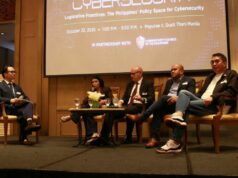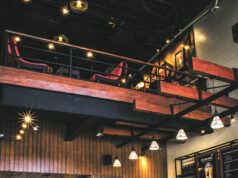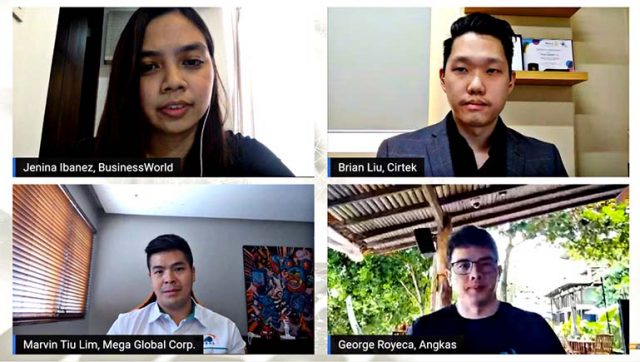
Next-gen executives discuss leadership lessons on last leg of BusinessWorld Insights Leadership Series
By Adrian Paul B. Conoza, Special Features writer
Millennials, defined by Pew Research as anyone born between 1981 and 1996, are starting to take over executive roles once held by previous generations. In their entry into the C-suite, millennials are bringing fresh perspectives and ideas into their organizations. Yet, there is still much room for them to learn from senior individuals as well as from their day-to-day experiences in directing their companies.
The third and last session of the BusinessWorld Insights Leadership Series, held last February 3, shone the spotlight on some of the millennial leaders among the business community. Each shared their experiences as executives in their companies, particularly the skills and realizations they learned along the way.
Building a level-playing field
As he moved around different roles, Brian Gregory T. Liu, chief financial officer of Cirtek Holdings Philippines Corp., learned the significant role relationships play. “Moving around different levels allowed me to build goodwill amongst team members, and this actually eased in the transition to the position in which I’m serving at the moment,” Mr. Liu said.
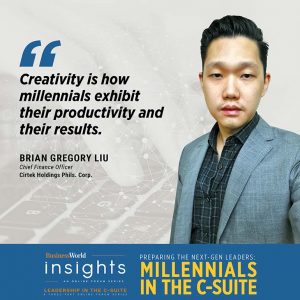 He believes that while managerial roles often entail tension between employees in the workplace, millennials have the skills to mitigate such tension since they are naturally people persons and team players.
He believes that while managerial roles often entail tension between employees in the workplace, millennials have the skills to mitigate such tension since they are naturally people persons and team players.
Building relationships is considered by Mr. Liu as a fitting way to deal with the pressures of working with senior team players, which he metaphorically called ‘barrier to entry’. “There’s always going to be a barrier to entry, but there’s always a way to solve that,” he said.
The CFO considers himself as an “enabler that allows individuals to let their lights shine through a level playing field.” He finds it important to allow his employees to contribute and have their voices heard.
“You need to create a less biased playing field by acting as the enabler and improving human resource management to identify [individuals’ strengths] in order not to ostracize [them],” Mr. Liu said.
He also shared that open communication must be maintained in the workplace — letting employees, regardless of position, to express their thoughts — as this can ease the anxieties arising from office politics.
“Open communication and a new culture of reduced politics are what we need to improve mental health in the workplace,” Mr. Liu stressed.
For Mr. Liu, a generalization about millennials that should be debunked is that they are supposedly lazy, noting that the freedom they enjoy and cherish enables them to become creative.
“Creativity is how millennials exhibit their productivity and their results, and that’s why they need their freedom,” he said.
Attitude, consistency, and patience
George Royeca, chief transport advocate at Angkas, pointed out that millennials — growing up appreciating issues such as climate change and equality — are distinct for bringing a ‘mindset of solving problems’.
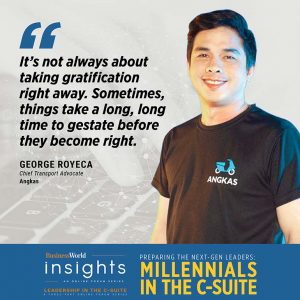 “Millennials care too much,” Mr. Royeca said, “but that is one of the major strengths of millennials… They want to put a lot of passion and energy into making things right.”
“Millennials care too much,” Mr. Royeca said, “but that is one of the major strengths of millennials… They want to put a lot of passion and energy into making things right.”
“The future generation is lucky to have this generation take on the world’s biggest problems, and I think they have the recipe to solve them,” he later added.
This is the kind of community that built the ride-hailing service, Mr. Royeca observed.
“Without millennials, Angkas would not have gotten off the ground,” he said. “Millennials have found a way to cut through different markets and develop the whole Angkas community.”
Describing himself as results-oriented, Mr. Royeca finds consistency and attitude as important traits leaders and team players should have.
“Attendance doesn’t matter to me so much as long as you are in the critical meetings and you know your KPIs (key performance indicators) and you deliver time and time again,” he said.
“You can be the smartest person in the room. But if your attitude sucks and you are arrogant as hell, then you’ll never be going to be a team player and move the company forward,” he added.
Moreover, Mr. Royeca finds it crucial for millennials to learn from past generations about patience. “It’s not always about taking gratification right away. Sometimes, things take a long, long time to gestate before they become right,” he said.
For the Angkas chief, patience, resilience, and grit are good arsenals to include in someone’s ‘war chest’ to move forward very successfully.
Mr. Royeca also shared that while it matters to understand seniors and listen to them, millennial leaders should also be firm enough to make their stand so that they will be taken more seriously.
“You need to be able to appeal to both sides, and you can only do so if you’re nimble enough to shift approaches,” he said.
Embracing both modernity and tradition
Marvin Tiu Lim, chief growth and development officer at Mega Global Corp., shared that given the tools, resources, and cards that millennials have been dealt with, they can achieve things that they can’t even imagine for now.
 “Hopefully, we can use our youthfulness to our advantage, to make an impact in the world,” Mr. Tiu Lim said.
“Hopefully, we can use our youthfulness to our advantage, to make an impact in the world,” Mr. Tiu Lim said.
Three characteristics helped him the most as a leader: respect for elders, empathy, and integrity. “I didn’t want to come in as a boss, so I started as van salesman. I knew how [my co-workers] felt… I knew their pain points and what was needed to be done to improve their lives,” he shared.
Mr. Tiu Lim describes his leadership style as ‘high-energy’. “I like the work to be fun. I plan company trips and cruises. I want people to enjoy their life in and out of work,” he explained.
Nonetheless, he finds that this high energy, coupled with an openness to constant change, must fuel his co-workers to become more adventurous, think out of the box, and learn from other businesses.
“It’s the ability to mix and balance both being outspoken and also being conservative at times, he added. “That nimbleness that millennials have should be put in the workplace.”
He stressed that a balance must be constantly struck between modern and traditional perspectives, “swaying left and right and making sure you find the right balance between the two”.
This can be applied, for instance, on taking points of view of senior leaders into consideration. “You have to listen [to them] because they are more patient than us… Sometimes, as millennials, our fault is we think we know everything,” Mr. Tiu-Lim said.
Advice to the millennial workplace
The panel also shared some advice to their fellow millennial leaders and team players.
Mr. Liu encourages leaders to stay creative and passionate as well as to never stop learning. “Our passion to explore the unknown and discover new things, learn new skillsets — these are what will fuel us to the future,” he said.
He also warned against obsolescence, which can be prevented by keeping an open mind and embracing disruption and innovation. “When you are transformative, you are ever-changing, immune to obsolescence,” Mr. Liu said.
Mr. Royeca, meanwhile, encourages working individuals to be entrepreneurs. “Learn from your work and apply that to your business,” he said, adding that entrepreneurs should also strive to market their ideas since nothing markets itself.
On the other hand, Mr. Tiu Lim reminded the millennial workforce to be prepared for the rapid growth of exponential technology.
“You won’t know what is coming until it is there,” he said, “But in your journey, have fun, embrace the changes, and make a positive impact.”

